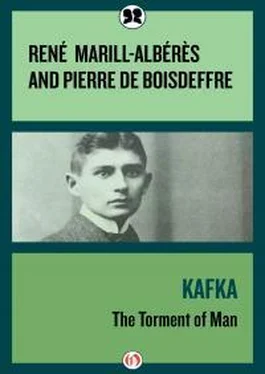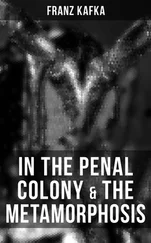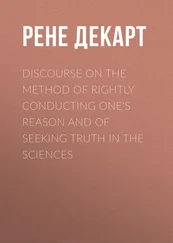This creative attitude brings us in direct confrontation with realism. The writer does not copy the world and does not try to explain it; he declares his dissatisfaction with it and suffers. The French who bear the closest affinity to Kafka are easily recognized: Nerval, Baudelaire, Flaubert. The poet, then, is necessarily cursed ( maudit ) since, to be a poet—to be tempted to search for a secret truth in the “misunderstanding” which separates man from the world—he obviously must have had direct acquaintance with this misunderstanding in an experience (voluntary or involuntary), such as Nerval’s madness, Baudelaire’s satanism, or Flaubert’s exasperation.
Kafka’s unhappy condition, the condition in which he discovered the thing that made him a “seer,” was loneliness: loneliness within his family, misunderstanding between himself and his father, isolation as a member of a Jewish community and, consequently, moral and religious exile, and finally the loneliness experienced by Kafka and transformed into a Passion, which he calls bachelorhood. As early as 1911, long before the drama of his meeting with F. B. and their broken engagement, Kafka viewed the state of bachelorhood as the symbol of his crucified life.
The bachelor’s unhappiness is so easily discerned by others that in every case, even when he would have remained celibate for his own pleasure or in secret, he will curse his decision… The further he withdraws from the living for whom he must nevertheless work, and this is the worst irony—for example, a conscious slave who does not have the right to express his consciousness—the smaller will be the space with which they think he should be satisfied … Beginning at the midpoint of his life, apparently in acccordance with his own will, he restricts himself to an ever diminishing space, and if he dies the shroud is exactly what he deserves. 3
The prose poems of Meditation have as their essential theme the single man whose loneliness is revealed to him by the strangeness of the world.
How bitter to remain a bachelor … To solicit an invitation and at the same time to preserve one’s dignity as a grown man, when one does not want to spend an evening alone.…
It seems so dreadful to be a bachelor, to struggle as an old man desperately to keep one’s dignity while begging to be accepted whenever one wants to spend an evening in company … to say good bye at the front door.… 4
Vignettes or sketches like Baudelaire’s, these short, rhythmic texts reveal his careful observation of life; its emptiness and vanity led him to question its meaning. Meaningless encounters and aimless wanderings characterize the episodes of “Preparations for a Wedding in the Country” and “Description of a Struggle.”
When one goes through the streets at night, one sometimes sees from afar a man running ahead, for the street slopes downward and the moon is full … It is a twilight world, a dark world, a world in which one goes out into the labyrinthine town without having anything to do there, a world in which one is alone, knowing neither who he is nor whose son or father or lover he is, nor perhaps whether he is a man …
The world appears empty to the lonely man. His look moves on and discovers the indecision of the universe; these roving despairing eyes hope to discover the light of reconciliation.
One who lives in isolation and yet would like to have a few ties with others … One who, making allowances for the changes that issue from the different moments of the day—fair weather or foul, professional circumstances or a thousand other facts—wishes simply to see an arm, any arm to which he can cling … this person cannot be deprived indefinitely of a window facing the street! And if there is a man who no longer has anything to pursue, if there is a tired man who draws near his window and lets his eyes rove between the sky and the street (he waits for nothing, his head is thrown back slightly).… Then, down below, the horses are pulling him along in the procession of carriages and the din to the final reconciliation with the rest of the world. 5
Like all those who are destined to be seers or half-wits at the threshold of the mysterious, Kafka seems to create at will the very conditions of his own martyrdom. All of this led quite naturally, around 1910, to the solitary room in which a charming individual—today he would be labeled a man with a complex—perhaps already sickly, smiling but misunderstood, was writing strange texts.
The bulb lighted, the apartment silent, darkness outside, the last instants of my vigil gave me the right to write, even if I wrote the most wretched things. And I hastily took advantage of this right. This, then, is what I am. 6
Kafka wrote “hastily,” especially when in a very peculiar state of exile, confinement, or alienation. He is known to have drafted the entire text of “The Judgment” between ten o’clock at night and six o’clock the next morning, on September 23, 1912. The next day he went to work at the office. And the office itself, his boring bureaucratic job, provided him with the myth of solitude. “As long as I am not freed from my office, I shall be lost, purely and simply.” 7He also had to suffer, like Flaubert, in order to create: “What anguish I suffered at first (not to be compared, of course, with my present anguish)! What coldness in my writing, which then haunted me for days!” 8Still, without a doubt, writing was for him a means of justification: “In spite of all my uneasiness, I rest on my novel just as a statue which looks into the distance rests on its pedestal.” 9A month later he found the same observation in the Correspondence of his cherished Flaubert: “My novel is the rock to which I cling and I know nothing about what goes on in the world.”
Before 1911 Kafka did not give to his writings the legendary value and symbolic character which were to characterize the works of his maturity. For him writing is indissolubly linked to the Passion of men doomed to the tortures associated with clairvoyance and poetry. One must contemplate the world and the slightest accidents of this world in order to find out what lies behind it: “Objects can be photographed mentally. My stories are a way of closing my eyes.” 10
Thus as with Flaubert (much more closely bound to the surface of the world, however), anguish does not exclude realism. Reality appears again and again in Kafka’s tales; it only awaits exorcism. Nothing in Kafka is more characteristic of Flaubert than the beginning of “Description of a Struggle” (1906?).
At the stroke of midnight several guests arose, bowed, shook hands, and stated that they had spent a very pleasant evening; then they passed through double swinging doors into the vestibule to collect their coats. Standing in the middle of the drawing room, the lady of the house gaily returned curtsy for curtsy. The folds of her dress undulated elegantly with each movement.
Seated in front of a small round table with three slender, curved legs, I sipped a third benedictine, without losing sight of the small store of pastries which I myself had selected and carefully placed on my plate …
No phantasmagorical element appears here; instead, we find minutiae, simplicity, and the preference for details which makes for good scholarly narration, mixed with a civil servant’s matter-of-factness, a certain artlessness, and humor. This “realistic” talent always allowed Kafka to evoke an oppressive, unknown world without subjecting himself to the accusation that he had left the so-called real, familiar world represented by the three legs of a table.
After this description of a mundane gathering in Prague as seen through the eyes of a petty employee, we might expect a “realistic” story. Everything, it seems, will take place among well-balanced, egotistical, cultivated people; there will be a competent, careful description of the social life and psychology of a few individuals. Imperceptibly, however, “Description of a Struggle” abandons logical decorum and becomes a series of incongruous episodes which remain realistic and true individually but collectively constitute a nightmare. The narrator—let us call him K., as in The Trial —leaves the mundane gathering and his cupcakes, accompanied by a friend whom he has met that evening. The two men walk in the darkness and talk.… This is the theme of nightly walks, the obsession of the single man.
Читать дальше












